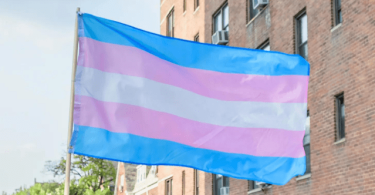Young trans youth showing their Pride in New York | Photo: GenderFamilyProject Instagram / Daniel Tepper
I am pleased to welcome leading health journal the Lancet’s positive opinion on the benefits of helping trans people when they are children.
It comes from reviewing new guidance published by the Royal Children’s Hospital Gender Service, Melbourne.
A key challenge for doctors and healthcare professionals, working in the field of gender care, has been the lack of published guidelines to support them in the treatment of gender variant children and young people.
It’s part of the reason a sometimes hysterical debate continues in the UK press about if young trans people should get care when they are younger.
So the Lancet’s acknowledgment of the significance of this guidance is a huge step forward. And it is an invitation to healthcare providers worldwide to take note.
The guidance itself will offer much-needed safety and protection and finally, a clear structure.
I have long said there robust clinical trials and medical evidence has hampered progression in this field.
To date, clinical experience and case histories have not been enough to convince those who worry that we may be harming children, that taking affirmative action, rather than refusing to treat, actually saves lives.
I am delighted that the authors have given due consideration to the current evidence that we do have and that they have drawn on the opinions and experience of those who have worked in the field.
This Lancet study is significant, because of the huge consultation involved
Perhaps most importantly, they have consulted experts widely – hearing and listening to the voices of medical professionals, support groups and those who have the most expertise: young transgender people and their families.
The key recommendations that support the social transition, and remove age restrictions on medical transition. This will surely help the severe mental distress that we see in this patient group.
Australia’s robust position should help concerns in the NHS too. Their approach remains far too conservative.
Most importantly, the guidance should give clinicians the confidence they need to take an individualized approach to treatment, without fear of recrimination.
Rigid protocols all over the world prevent young people from accessing life-saving care.
And it’s all based on a high standard of care for trans people in Australia.
What is Australia doing that is different from the rest of the world?
Australia believes in individualized care. They do not have a one size fits all ‘protocol.’ Something many healthcare systems adopt with gender dysphoria.
They also believe that children do have the capacity to determine their treatment pathway. This is a controversial stance across the world, and particularly in the UK currently. But in reality what this is promoting is: listening to the child, hearing their story, learning from them.
Essentially the focus is on treatment according to capacity to consent and understand, rather than by age.
The UK has the regard of a forward-thinking nation. The NHS is supposed to be a flagship admired around the world. But its approach to treating transgender patients can be sorely lacking. I hope the NHS will adopt this into their protocols.
Read more from Gay Star News:
This doctor gives hormones to trans 12-year-olds and the establishment wants to shut her down







